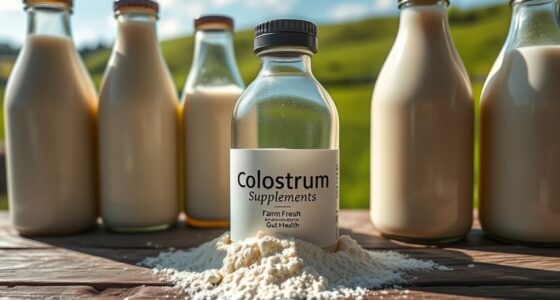High-protein diets can boost muscle growth, support weight loss, and improve overall health by helping you feel full and preserving lean muscle. However, excess intake may strain your kidneys and cause nutrient imbalances if not carefully balanced. It’s best to spread protein sources throughout the day and include diverse, high-quality options. To learn how to navigate these benefits and risks effectively, explore the key strategies for maintaining a healthy, balanced approach.
Key Takeaways
- High-protein diets support muscle growth, weight loss, and satiety when balanced with other nutrients.
- Proper timing and quality protein sources enhance absorption and muscle synthesis efficiency.
- Excessive protein intake can strain kidneys and cause nutrient imbalances; moderation is essential.
- Incorporating diverse protein sources, including plant-based options, ensures complete amino acid profiles.
- Spreading protein consumption throughout the day optimizes absorption and promotes overall health.

High-protein diets have gained popularity as a way to support weight loss, muscle building, and overall health. If you’re considering increasing your protein intake, it’s vital to understand how your body absorbs and utilizes it. Protein absorption is the process where your digestive system breaks down dietary proteins into amino acids, which then enter your bloodstream. This process varies depending on the type of protein you consume; for example, animal proteins like eggs and lean meats tend to be absorbed more efficiently than some plant-based sources. When you eat enough high-quality protein, your body can absorb these amino acids quickly, making them available for various functions, including muscle synthesis. Using proper brewing techniques can also be seen as a metaphor for how the body efficiently processes nutrients, highlighting the importance of proper preparation and timing.
Muscle synthesis is where your body repairs and builds new muscle tissue, especially after exercise or injury. Consuming adequate protein fuels this process, helping you gain strength and improve muscle mass. When your body efficiently absorbs dietary proteins, it supplies a steady stream of amino acids necessary for muscle synthesis. This is particularly important if you’re engaging in resistance training or trying to recover from workouts, as it maximizes muscle repair and growth. It’s worth noting that not all proteins are equal in promoting muscle synthesis; complete proteins that contain all essential amino acids—like those found in animal products—are generally more effective. Still, combining different plant-based sources can also provide all necessary amino acids, supporting muscle repair.
However, it’s vital to strike a balance. While higher protein intake can enhance muscle synthesis and support weight loss by increasing satiety and preserving lean muscle mass, consuming excessively large amounts may strain your kidneys or lead to nutrient imbalances. Your body can only absorb a certain amount of protein at a time, usually around 20-30 grams per meal, so spreading your intake throughout the day ensures ideal absorption and muscle building. Additionally, a diet too high in protein at the expense of other nutrients can reduce your intake of fiber, vitamins, and minerals essential for overall health.
Frequently Asked Questions
Can High-Protein Diets Be Suitable for Vegetarians or Vegans?
Yes, high-protein diets can suit vegetarians and vegans, as long as you incorporate plant-based proteins and vegan alternatives. You can enjoy beans, lentils, tofu, tempeh, seitan, and quinoa to meet your protein needs. By diversifying your sources, you guarantee you get essential amino acids. Planning your meals carefully helps balance your diet, making high-protein eating both nutritious and compatible with plant-based lifestyles.
How Do High-Protein Diets Impact Kidney Health Long-Term?
High-protein diets can strain your kidney function over time if you have existing kidney issues, as protein overload increases the workload on your kidneys. While healthy individuals may not experience significant long-term damage, consuming excessive protein consistently may lead to reduced kidney efficiency. It’s essential to observe your intake and consult a healthcare professional to make certain your kidneys stay healthy while maintaining a high-protein diet.
What Are the Alternatives to Animal-Based Protein Sources?
You can switch to plant-based proteins like legumes, which include various legume varieties such as lentils, chickpeas, and beans. These options provide essential amino acids and are generally lower in saturated fat. Incorporate tofu, tempeh, or edamame into your meals for added variety. Not only do these alternatives support your protein needs, but they also promote heart health and are sustainable choices for a balanced diet.
Are High-Protein Diets Effective for Weight Loss in All Age Groups?
High-protein diets can be effective for weight loss across all age groups, but you should tailor your approach based on age-specific strategies. Metabolic differences mean that younger individuals may process protein more efficiently, while older adults might need additional adjustments to support muscle maintenance and bone health. Consult with a healthcare professional to create a personalized plan that considers these factors, ensuring safe and effective weight management at any age.
How Can One Prevent Nutrient Deficiencies on a High-Protein Diet?
Ironically, avoiding micronutrient gaps on a high-protein diet isn’t rocket science. You should diversify your food sources—think vegetables, fruits, and whole grains—to cover all bases. Supplementation strategies can help fill any gaps, especially for nutrients like fiber, vitamins, and minerals. Keep an eye on your nutrient intake, and consider consulting a dietitian to tailor your diet, ensuring you get all essential micronutrients without sacrificing protein.
Conclusion
As you consider a high-protein diet, remember that its benefits and drawbacks often seem to align unexpectedly. Sometimes, what boosts your energy can also challenge your kidneys, or increased satiety might lead to overlooked nutrient gaps. It’s like finding a coin on the street—seems simple at first, but its value depends on how you use it. Stay mindful of these subtle coincidences, and you’ll navigate your diet with both awareness and confidence.









